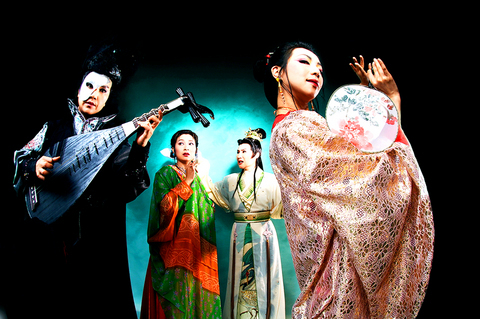A mysterious man, wondrously talented but disfigured, haunts the dark corners of a tower. A beautiful maiden, who with her charm and innocence persuades him to come forth. A tragic love triangle.
This isn't the plot of Phantom of the Opera but the upcoming Taiwanese Opera production Who Is My Bride?
A production of the Tang Mei Yun Taiwanese Opera Group (唐美雲歌仔戲團), one of Taiwan's top troupes, Who Is My Bride? borrows key plot elements and set pieces from the internationally acclaimed Phantom and puts them in an historical Chinese context.

PHOTO COURTESY OF TANG MEI YUN OPERA
Founded in 1999 by Tang Mei-yun (唐美雲), daughter of Chiang Wu-tung (蔣武童) an early pioneer of Taiwanese opera , the troupe has for many years been trying to reinvent the art form to make it relevant to contemporary society.
"In order to introduce Taiwanese opera to a younger audience, we took a step back and analyzed what might turn off the new generation of audiences," explained Tang, who both stars in and directs the new production. "We realized we had to create characters and situations that engaged the audience and ... not just preach traditional morality."
The story unfolds in three different eras. Whether trans-planting elements from a hit show such as Phantom across time and cultures can reinvigorate Taiwanese opera, and make it appeal to youngsters in the era of game consoles and computers remains to be seen.
"We like to think of this as the Chinese version of Phantom of the Opera, but with an emphasis on traditional Chinese music, bringing the story into a mystical eastern setting that is nothing like you've ever imagined," Tang said.
Performance notes:
What: Tang Mei Yun Taiwanese Opera Group's Who is my Bride?
Where: National Theater Hall
When: Today through Sunday with evening performances starting at 7:30pm, and afternoon performances starting at 2:30pm
Tickets: Tickets cost between NT$400 and NT$2,000 and are available at Arts Ticketing, visit www.artsticket.com.tw for more details

The unexpected collapse of the recall campaigns is being viewed through many lenses, most of them skewed and self-absorbed. The international media unsurprisingly focuses on what they perceive as the message that Taiwanese voters were sending in the failure of the mass recall, especially to China, the US and to friendly Western nations. This made some sense prior to early last month. One of the main arguments used by recall campaigners for recalling Chinese Nationalist Party (KMT) lawmakers was that they were too pro-China, and by extension not to be trusted with defending the nation. Also by extension, that argument could be

Aug. 4 to Aug. 10 When Coca-Cola finally pushed its way into Taiwan’s market in 1968, it allegedly vowed to wipe out its major domestic rival Hey Song within five years. But Hey Song, which began as a manual operation in a family cow shed in 1925, had proven its resilience, surviving numerous setbacks — including the loss of autonomy and nearly all its assets due to the Japanese colonial government’s wartime economic policy. By the 1960s, Hey Song had risen to the top of Taiwan’s beverage industry. This success was driven not only by president Chang Wen-chi’s

Last week, on the heels of the recall election that turned out so badly for Taiwan, came the news that US President Donald Trump had blocked the transit of President William Lai (賴清德) through the US on his way to Latin America. A few days later the international media reported that in June a scheduled visit by Minister of National Defense Wellington Koo (顧立雄) for high level meetings was canceled by the US after China’s President Xi Jinping (習近平) asked Trump to curb US engagement with Taiwan during a June phone call. The cancellation of Lai’s transit was a gaudy

The centuries-old fiery Chinese spirit baijiu (白酒), long associated with business dinners, is being reshaped to appeal to younger generations as its makers adapt to changing times. Mostly distilled from sorghum, the clear but pungent liquor contains as much as 60 percent alcohol. It’s the usual choice for toasts of gan bei (乾杯), the Chinese expression for bottoms up, and raucous drinking games. “If you like to drink spirits and you’ve never had baijiu, it’s kind of like eating noodles but you’ve never had spaghetti,” said Jim Boyce, a Canadian writer and wine expert who founded World Baijiu Day a decade